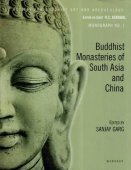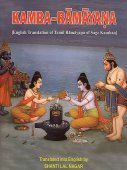Persia: 1 definition
Introduction:
Persia means something in Buddhism, Pali. If you want to know the exact meaning, history, etymology or English translation of this term then check out the descriptions on this page. Add your comment or reference to a book if you want to contribute to this summary article.
In Buddhism
Mahayana (major branch of Buddhism)
Source: archive.org: Bulletin of the French School of the Far East (volume 5)Persia (in Chinese: Po-sse) refers to one of the fifty-five kingdoms enumerated in chapter 17 of the Candragarbha: the 55th section of the Mahāsaṃnipāta-sūtra, a large compilation of Sūtras (texts) in Mahāyāna Buddhism partly available in Sanskrit, Tibetan and Chinese.—In the Candragarbhasūtra, the Bhagavat invites all classes of Gods and Deities to protect the Law [dharma?] and the faithful in their respective districts.—In Persia, the following deities are appointed (among others): The Devaputra T'an-neou-che; the Gandharva Keou-p'i-lo (Kuvera); the Kinnara Li-pi-mo-che; the Gandharva Ngan-lo-t'i-t'o; the Kinnara Yi-cha-na-che; the Kumbhāṇḍa Kie-so-p'o-keou-tchi; the Rakṣas Na-lo-sseu and Ho-li-to (Hārita).
Persia (in Chinese: Po-sseu) is the name of an ancient kingdom associated with Pūrvaphalgunī (or Pūrvaphalgunīnakṣatra) and Uttaraphalgunī (or Uttaraphalgunīnakṣatra), as mentioned in chapter 18.

Mahayana (महायान, mahāyāna) is a major branch of Buddhism focusing on the path of a Bodhisattva (spiritual aspirants/ enlightened beings). Extant literature is vast and primarely composed in the Sanskrit language. There are many sūtras of which some of the earliest are the various Prajñāpāramitā sūtras.
See also (Relevant definitions)
Starts with: Persian acacia, Persian lilac, Persian manna, Persian manna plant, Persian rose, Persian walnut.
Ends with: Pride of persia.
Full-text (+22): Parasika, Pharasha, Sindhuvara, Pharashi, Pride of persia, Vanayuja, Irani, Damavandu, Iran, Kicumicu, Gandhara, Paracikam, Parci, Parsha, Parshi, Pallavabhogga, Paradana, Kubera, Parshika, Parishi.
Relevant text
Search found 53 books and stories containing Persia; (plurals include: Persias). You can also click to the full overview containing English textual excerpts. Below are direct links for the most relevant articles:
The Anglo-Iranian Oil Politics < [April 1951]
Islamic Calligraphy < [October – December, 1978]
The Coming of the Mystics < [April 1937]
A Manual of Khshnoom (by Phiroz Nasarvanji Tavaria)
Buddhist records of the Western world (Xuanzang) (by Samuel Beal)
Chapter 19 - Country of Lang-kie-lo (Langala) < [Book XI - Twenty-three Countries]
Chapter 20 - Country of Po-la-sse (Persia) < [Book XI - Twenty-three Countries]
Chapter 31 - Country of Ta-la-kien (Talikan) < [Book I - Thirty-Four Countries]
Parables of Rama (by Swami Rama Tirtha)
Story 21 - Subtle body of the Realized Soul < [Chapter IV - God-consciousness]
Story 35 - Cause of Religious Quarrels < [Chapter VI - Ignorance]
Story 100 - The Result of Renunciation < [Chapter XV - Renunciation]
The civilization of Babylonia and Assyria (by Morris Jastrow)
Part XXI < [Chapter III - Survey Of The History Of Babylonia And Assyria]
Part I < [Chapter II - The Decipherment Of The Cuneiform Script]
Part I < [Chapter I - Excavations At Babylonian And Assyrian Sites]
Rasa Jala Nidhi, vol 5: Treatment of various afflictions (by Bhudeb Mookerjee)
Part 25 - Ar-Razi and the Indian knowledge of metallic chemistry < [A Brief History of Indian Chemistry and Medicine]
Part 1 - Introduction (justifying ancient Indian knowledge of the use of mercury) < [A Brief History of Indian Chemistry and Medicine]
Related products


